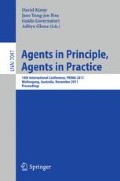Abstract
Dynamics are one of the most important properties of multi-agent systems (MAS), which often operate in open environment and with dynamically changing requirements. This paper firstly gives a comprehensive view of the dynamics in MAS based on “where” and “what” aspects of change and discusses the software engineering issues of engineering such dynamics. To solve related issues, we propose an organization-based programming approach that provides programming abstraction and mechanisms to describe and manage dynamics of MAS. An organization-based language for programming dynamics (OBLPD) of MAS is defined. The syntax of OBLPD is defined and its semantics are informally explained with a case study.
Access this chapter
Tax calculation will be finalised at checkout
Purchases are for personal use only
Preview
Unable to display preview. Download preview PDF.
References
Jennings, N.R.: An agent-based approach for building complex software systems. Communication of ACM 44(4), 35–41 (2001)
Dignum, V.: The Role of Organization in Agent Systems. In: Dignum, V. (ed.) Handbook of Research on Multi-Agent Systems: Semantics and Dynamics of Organizational Models, pp. 1–16. IGI Global (2009)
DeLoach, S.A., Oyenan, W.H., Matson, E.: A capabilities-based model for adaptive organizations. Autonomous Agents and Multi-Agent Systems 16(1), 13–56 (2008)
Ferber, J., Gutknecht, O., Michel, F.: From Agents to Organizations: an Organizational View of Multi-Agent Systems. In: Giorgini, P., Müller, J.P., Odell, J.J. (eds.) AOSE 2003. LNCS, vol. 2935, pp. 214–230. Springer, Heidelberg (2004)
Costa, A.C.R., Dimuro, G.P.: A Minimal Dynamical MAS Organization Model. In: Dignum, V. (ed.) Handbook of Research on Multi-Agent Systems: Semantics and Dynamics of Organizational Models, pp. 419–445. IGI Global (2009)
Dignum, V.: Handbook of Research on Multi-Agent Systems: Semantics and Dynamics of Organizational Models (2009)
Bordini, R.H., Dastani, M., Dix, J., El Fallah Seghrouchni, A. (eds.): Multi-Agent Programming: Languages, Platforms and Applications. Springer, Heidelberg (2005)
Weyns, D., Heasevoets, R., Helleboogh, A.: The MACODO Organization Model for Context-driven Dynamic Agent Organizations. ACM Transactions on Autonomous and Adaptive Systems 5(4), 1–29 (2010)
Hübner, J.F., Sichman, J.S., Böissier, O.: Developing organised multiagent systems using the MOISE+ model: programming issues at the system and agent levels. International Journal of Agent-Oriented Software Engineering 1(3/4), 370–395 (2007)
Garcia, E., Argente, E., Giret, A., Botti, V.: Issues for Organizational Multiagent Systems Development. In: Jung, Michel, Ricci, Petta (eds.) 6th Int. Workshop on AT2AI-6 Working Notes, From Agent Theory to Agent Implementation, AAMAS 2008, Estoril, Portugal, EU, May 13 (2008)
Tinnemeier, N.A.M.: Organizing Agent Organizations: Syntax and Operational Semantics of an Organization-Oriented Programming Language. SIKS Dissertation Series 2011(2), Utrecht University (2011)
Ghidini, C., Hirsh, B., Fisher, M.: Programming group computations. In: Proceedings of the First European Workshop on Multi-Agent System, EUMAS (2003)
Baldoni, M., Boella, G., Genovese, V., Grenna, R., van der Torre, L.: How to Program Organizations and Roles in the JADE Framework. In: Bergmann, R., Lindemann, G., Kirn, S., Pěchouček, M. (eds.) MATES 2008. LNCS (LNAI), vol. 5244, pp. 25–36. Springer, Heidelberg (2008)
Gaud, N., Galland, S., Hilaire, V., Koukam, A.: An Organisational Platform for Holonic and Multiagent Systems. In: Hindriks, K.V., Pokahr, A., Sardina, S. (eds.) ProMAS 2008. LNCS, vol. 5442, pp. 104–119. Springer, Heidelberg (2009)
Author information
Authors and Affiliations
Editor information
Editors and Affiliations
Rights and permissions
Copyright information
© 2011 Springer-Verlag Berlin Heidelberg
About this paper
Cite this paper
Hu, C., Mao, X., Zhou, H. (2011). Programming Dynamics of Multi-Agent Systems. In: Kinny, D., Hsu, J.Yj., Governatori, G., Ghose, A.K. (eds) Agents in Principle, Agents in Practice. PRIMA 2011. Lecture Notes in Computer Science(), vol 7047. Springer, Berlin, Heidelberg. https://doi.org/10.1007/978-3-642-25044-6_23
Download citation
DOI: https://doi.org/10.1007/978-3-642-25044-6_23
Publisher Name: Springer, Berlin, Heidelberg
Print ISBN: 978-3-642-25043-9
Online ISBN: 978-3-642-25044-6
eBook Packages: Computer ScienceComputer Science (R0)

